BusinessEurope Headlines No. 2018-31
Job creation must be at the heart of the EU strategy
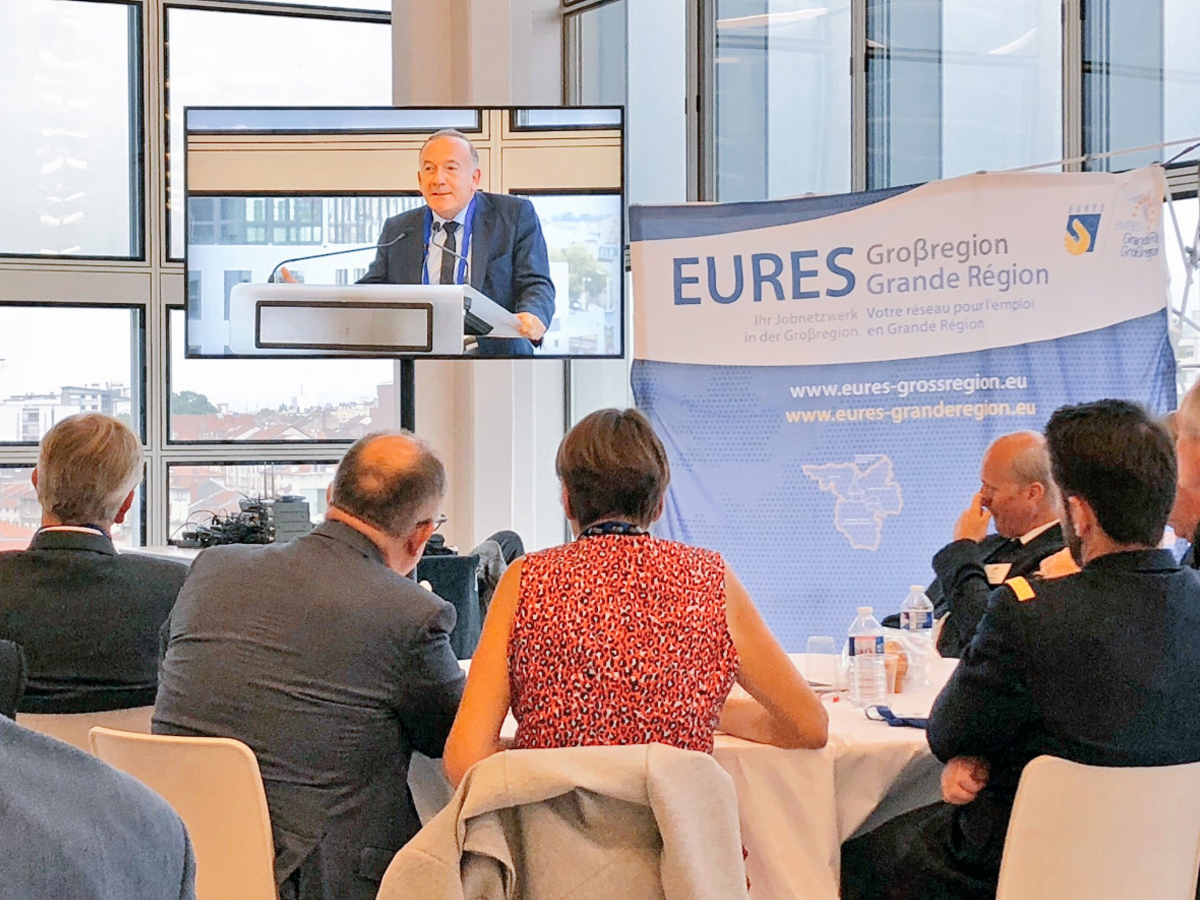
Growth, trust, skills and competitiveness. This is the winning formula in a moment in which the European project is threatened by populism and protectionism. This was one of the key messages of BusinessEurope President Pierre Gattaz during his intervention at the conference “L’Entreprise et l’Emploi, Clés du Futur de l’Europe”, organised by MEDEF Meurthe-et-Moselle on 2 October in Nancy. For President Gattaz “jobs are an indispensable element in building prosperity and peace in the continent and must be at the heart of the European strategy. And to increase the long-term economic growth of our countries we need effective education and training systems. The way we progress on education impacts on Europe’s global competitive position”, he said, adding that "our capacity to maintain high levels of social well-being in the future relies on our capacity to increase productivity today".
Contact: Daniele Olivieri
Photo copyright: K.RAINKA
Video message on the World Trade Organisation
BusinessEurope and our members deliver strong messages in support of multilateral trade and the WTO. Watch the video here.
Our comment
Curbing plastics waste as a shared responsibility
By Leon de Graaf, Adviser for Industrial Affairs
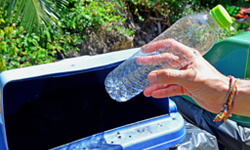 The need to prevent plastic and all other litter from reaching our oceans and environment is clear and undisputable. For us, European companies big and small, it makes economic sense – agriculture, fisheries and tourism suffer from littering, and billions worth of resources are potentially wasted as they are thrown away rather than being reused or recycled. But is banning plastics a panacea? And should companies be solely responsible for curbing plastics littering?
The need to prevent plastic and all other litter from reaching our oceans and environment is clear and undisputable. For us, European companies big and small, it makes economic sense – agriculture, fisheries and tourism suffer from littering, and billions worth of resources are potentially wasted as they are thrown away rather than being reused or recycled. But is banning plastics a panacea? And should companies be solely responsible for curbing plastics littering?
In response to the broad public concern, in May 2018 the European Commission came up with a far-reaching proposal to tackle single-use plastics litter. The measures proposed include a ban on certain single-use plastics and an extended responsibility scheme for producers. The latter makes producers entirely responsible for the clean-up costs of plastics litter, its treatment and transport, and the costs of awareness raising. We are concerned with this proposal because a ban might not solve the littering problem and companies will be made to pay for aspects that are beyond their control.
The legislators hope that banning single-use plastics will stimulate material substitution to more reusable forms of plastic, paper and bamboo, but this does not mean that these more ‘environmental’ products will not end up in our streets, environment and ocean. It also depends if consumers throw the trash in the proper waste bin, and if the waste is properly collected and managed. If that doesn’t happen, will those other products also be consequently banned if littering continues? Instead, companies should be incentivised to design products in ways that facilitates reuse and recycling, but when someone throws a food wrapper out of the car instead of in the bin, it should not be the producer who is solely responsible for the clean-up cost.
Instead, it is important to focus on raising awareness to minimise any form of inappropriate disposal – first of all by consumers. The awareness campaigns, but also improving sorting, collection and treatment of waste can be partly funded by producers, but also in part by other players across the value chain and by society as a whole. Too costly schemes for plastics producers will only mean that fewer funds are at their disposal to innovate and produce more circular products.
What is interesting as well is that only 2% of plastic waste ending up in the oceans originate from Europe and the US. More international actions are therefore needed to prevent marine litter. This is where the EU can obviously play a large role by showing other countries what works and what doesn’t. In the EU, existing and recently reformed waste rules are already very ambitious. If properly implemented in all EU countries, the result would bring a real change. This includes minimising landfilling, setting up proper collection and sorting systems, as well as supporting research and innovation to develop more sustainable alternatives and recycling technologies.
Plastics is not the enemy of the environment, but rather its incorrect management and disposal. To make a real change, we should think big. The European companies are ready to make their contribution but curbing plastics littering is a shared responsibility.
Contact: Leon de Graaf
Competitiveness is key for a successful EU social model
 BusinessEurope Director General Markus J. Beyrer spoke at a panel on “The European Social Model – can we still afford it in the globalised world?” held by the European Economic and Social Committee in the frame of this year’s European Forum for New Ideas (EFNI) organised by the Polish Confederation Lewiatan. He stressed that a thriving business community will be key for Europe’s social model to perform well and be sustainable. While it is important for Europe to tackle common challenges such as skills shortages, labour market integration and demographic change, it is crucial to respect the subsidiarity principle in this policy area and respect EU member states’ different starting points in economic and social development. In his speech at the closing ceremony of EFNI, DG Beyrer also once more underlined the importance of a forward looking Multiannual Financial Framework for a favourable investment climate. “At times when our major global competitors are driving heavy investment programs to increase competitiveness, the European Union must not miss the momentum to agree on an equally ambitious package to strengthen our economy”, he concluded.
BusinessEurope Director General Markus J. Beyrer spoke at a panel on “The European Social Model – can we still afford it in the globalised world?” held by the European Economic and Social Committee in the frame of this year’s European Forum for New Ideas (EFNI) organised by the Polish Confederation Lewiatan. He stressed that a thriving business community will be key for Europe’s social model to perform well and be sustainable. While it is important for Europe to tackle common challenges such as skills shortages, labour market integration and demographic change, it is crucial to respect the subsidiarity principle in this policy area and respect EU member states’ different starting points in economic and social development. In his speech at the closing ceremony of EFNI, DG Beyrer also once more underlined the importance of a forward looking Multiannual Financial Framework for a favourable investment climate. “At times when our major global competitors are driving heavy investment programs to increase competitiveness, the European Union must not miss the momentum to agree on an equally ambitious package to strengthen our economy”, he concluded.
Contact: Jasmin Ploner
Photo copyright: K.RAINKA
Trade can help fight climate change
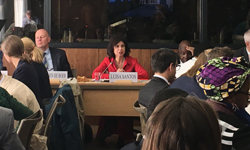 When it comes to the relationship between trade and climate change, governments, business and civil society organisations need to work together to accelerate positive externalities. This was the main message that panellists passed at the working session organised by BusinessEurope in the context of the World Trade Organisation (WTO) Public Forum that took place in Geneva on 2-4 October. They stated that technologies can offer solutions to support the fight against climate change while at the same time, governments and multilateral organisations such as the WTO should set up the right framework of rules to allow innovative technologies to develop and be accessible to countries around the world both developed and developing.
When it comes to the relationship between trade and climate change, governments, business and civil society organisations need to work together to accelerate positive externalities. This was the main message that panellists passed at the working session organised by BusinessEurope in the context of the World Trade Organisation (WTO) Public Forum that took place in Geneva on 2-4 October. They stated that technologies can offer solutions to support the fight against climate change while at the same time, governments and multilateral organisations such as the WTO should set up the right framework of rules to allow innovative technologies to develop and be accessible to countries around the world both developed and developing.
Contact: Sofia Bournou
Trade agreements are the key tool to support innovative companies
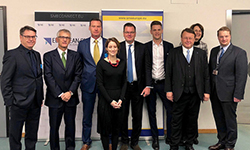 “EU textile companies invest in research and development and place their strength and their competitive advantage on innovation. Trade policy can support the future competitiveness of the sector, and in particular bilateral agreements can open new opportunities for companies in the European textile and fashion sector”, said Eleonora Catella, BusinessEurope Senior Trade Advisor, during the working breakfast “EU Free Trade Agreements: The Best Deal for Innovative Industries – New Opportunities for European Textile and Fashion”, held at the European Parliament in Brussels on 27 September. The event, organised by Small and Medium Entrepreneurs of Europe (SME Europe) and the Confederation of the German Textile and Fashion Industry (textile+mode), welcomed trade experts from textiles companies and European institutions. Catella highlighted several chapters in a modern trade agreement that can support innovative companies, including tariff elimination and rules of origin, public procurement and the protection of intellectual property rights. She cited as an example the EU-Canada Comprehensive Economic and Trade Agreement (CETA), which has already delivered very positive results: in one year of implementation, EU exports of clothing to Canada grew by 11%. “This is why EU businesses hope the EU-Japan free trade agreement can be soon ratified by the European Parliament", Catella concluded.
“EU textile companies invest in research and development and place their strength and their competitive advantage on innovation. Trade policy can support the future competitiveness of the sector, and in particular bilateral agreements can open new opportunities for companies in the European textile and fashion sector”, said Eleonora Catella, BusinessEurope Senior Trade Advisor, during the working breakfast “EU Free Trade Agreements: The Best Deal for Innovative Industries – New Opportunities for European Textile and Fashion”, held at the European Parliament in Brussels on 27 September. The event, organised by Small and Medium Entrepreneurs of Europe (SME Europe) and the Confederation of the German Textile and Fashion Industry (textile+mode), welcomed trade experts from textiles companies and European institutions. Catella highlighted several chapters in a modern trade agreement that can support innovative companies, including tariff elimination and rules of origin, public procurement and the protection of intellectual property rights. She cited as an example the EU-Canada Comprehensive Economic and Trade Agreement (CETA), which has already delivered very positive results: in one year of implementation, EU exports of clothing to Canada grew by 11%. “This is why EU businesses hope the EU-Japan free trade agreement can be soon ratified by the European Parliament", Catella concluded.
Contact: Eleonora Catella
State funded industrial espionage is being made too easy
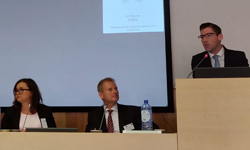 On 4 October, Digital Economy Adviser, Patrick Grant spoke on behalf of BusinessEurope at a roundtable on Industrial espionage in the digital world. This European Commission event brought policy makers and industry together to discuss the rising concern Europe has in relation to industrial espionage. Grant explained that while hard to quantify as breaches are not discovered until late, it is understood that cyber-enabled IP theft drains around 2% of EU GDP. However, when highlighting the scale of the problem, figures are likely to be highly underestimated as future losses cannot be fully comprehended. “This doesn’t mean Europe should not act. Anecdotal evidence explains that as digital becomes more engrained into our industrial sectors and IP becomes ever more valuable and sensitive, a rise in state funded industrial espionage beyond the reach of European law enforcement agencies is taking place”, Grant highlighted. He added that with a lack of a European solution to this problem, this toxic mix makes the chances of being caught and punished too low. Cyber-enabled IP theft is therefore too easy and too rewarding in Europe. This puts future European innovation, jobs, competitiveness and prosperity at risk. We call for rapid action from the next legislature. Read more from BusinessEurope’s statement – here.
On 4 October, Digital Economy Adviser, Patrick Grant spoke on behalf of BusinessEurope at a roundtable on Industrial espionage in the digital world. This European Commission event brought policy makers and industry together to discuss the rising concern Europe has in relation to industrial espionage. Grant explained that while hard to quantify as breaches are not discovered until late, it is understood that cyber-enabled IP theft drains around 2% of EU GDP. However, when highlighting the scale of the problem, figures are likely to be highly underestimated as future losses cannot be fully comprehended. “This doesn’t mean Europe should not act. Anecdotal evidence explains that as digital becomes more engrained into our industrial sectors and IP becomes ever more valuable and sensitive, a rise in state funded industrial espionage beyond the reach of European law enforcement agencies is taking place”, Grant highlighted. He added that with a lack of a European solution to this problem, this toxic mix makes the chances of being caught and punished too low. Cyber-enabled IP theft is therefore too easy and too rewarding in Europe. This puts future European innovation, jobs, competitiveness and prosperity at risk. We call for rapid action from the next legislature. Read more from BusinessEurope’s statement – here.
![]() Contact: Patrick Grant
Contact: Patrick Grant
Economic and Monetary Union discussed with Austrian Presidency representative
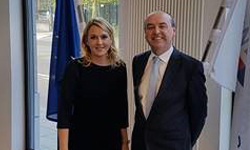 BusinessEurope’s Economic and Monetary Affairs committee (ECFIN) welcomed to its meeting on 27 September Eva Maria Liebmann-Pesendorfer, Counselor at the Permanent Representation of Austria to the EU. The group discussed, amongst other issues, the work programme of the Austrian Presidency on economic files and, in particular, ongoing work on deepening the Economic and Monetary Union (EMU), which will reach an important stage with the Euro Summit in December. Following Liebmann-Pesendorfer’s presentation, the group discussed the importance and urgency business places on deepening the EMU.
BusinessEurope’s Economic and Monetary Affairs committee (ECFIN) welcomed to its meeting on 27 September Eva Maria Liebmann-Pesendorfer, Counselor at the Permanent Representation of Austria to the EU. The group discussed, amongst other issues, the work programme of the Austrian Presidency on economic files and, in particular, ongoing work on deepening the Economic and Monetary Union (EMU), which will reach an important stage with the Euro Summit in December. Following Liebmann-Pesendorfer’s presentation, the group discussed the importance and urgency business places on deepening the EMU.
Contact: Frederik Lange
Circular economy: lack of information still a big challenge
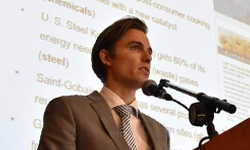 “Businesses across Europe continue to integrate circular economic thinking into their business practices in various ways. The next step for Europe is to create a real market for secondary raw materials”, said BusinessEurope’s Environment and Climate Adviser Leon de Graaf at the International Roundtable for Circular Economy, on 3 October in Brno, Czech Republic. The event brought together businesses and policymakers from across Europe to discuss the challenges, issues and best practices on circular economy. “From the 140 examples we collected so far on the Circular Economy Industry Platform, we can see that a lack of finance, lack of consistent legislation and lack of demand across the value chain are some of the biggest issues companies are facing. Policymakers can facilitate the progress by improving information to businesses and consumers, leveraging EU funds for circular economy and by making legislation fit-for-purpose”, he added.
“Businesses across Europe continue to integrate circular economic thinking into their business practices in various ways. The next step for Europe is to create a real market for secondary raw materials”, said BusinessEurope’s Environment and Climate Adviser Leon de Graaf at the International Roundtable for Circular Economy, on 3 October in Brno, Czech Republic. The event brought together businesses and policymakers from across Europe to discuss the challenges, issues and best practices on circular economy. “From the 140 examples we collected so far on the Circular Economy Industry Platform, we can see that a lack of finance, lack of consistent legislation and lack of demand across the value chain are some of the biggest issues companies are facing. Policymakers can facilitate the progress by improving information to businesses and consumers, leveraging EU funds for circular economy and by making legislation fit-for-purpose”, he added.
Contact: Leon de Graaf
Photo copyright: SPCR
More attention needed to avoid creating extra burdens on SMEs
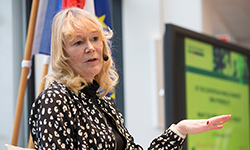
“BusinessEurope is concerned that the interaction between the 1999 Directive on the Sale of Consumer Goods and the Geo-blocking regulation will be complicated”, said Anna-Lena Bohm, Chair of BusinessEurope’s Entrepreneurship and Small and Medium-sized Enterprises (SME) Committee at the last meeting of the EU Network of SME Envoys on 25 September. She stated that everything should be made to ensure that the interaction between the Geo-blocking regulation and the future Directive on the online sales of goods does not oblige SMEs to get drawn into transactions and after-sales activities involving consumers in countries where they don’t want to be active for specific reasons. Commenting on the European Commission proposal for a Directive on transparent and predictable working conditions, Bohm stressed that the reduced possibilities for exemptions of short-term contracts (compared with the current Written Statement Directive) will hinder the flexibility that is essential for SMEs in many sectors.
Contact: Daniel Cloquet
Calendar
- 8 October: Fifth Assessment Report of the United Nations Intergovernmental Panel on Climate Change
- 9 October: Environment Council
- 18 October: Asia-Europe Business Forum (AEBF)
- 18-19 October: 12th Asia-Europe Meeting (ASEM) summit
- 18-19 October: European Council
Reminder: please take a look at our revised privacy policy
